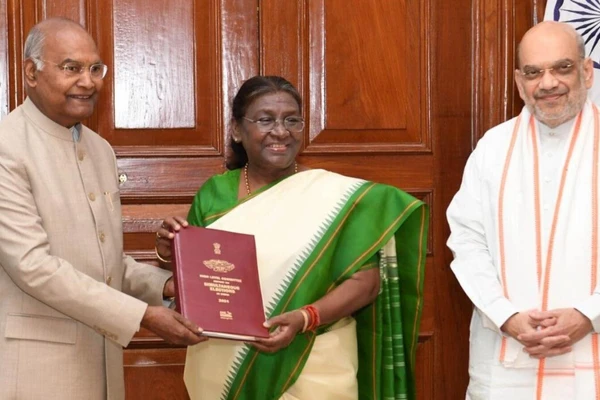The High-level Committee on Simultaneous Elections recently submitted its Report on One Nation, One Election to the President of India.
About the High-Level Committee:
- The Committee on Simultaneous Elections was constituted under the Chairmanship of Shri Ram Nath Kovind, former President of India and other members.
- The other members of the Committee included Union Minister of Home Affairs, former Leader of Opposition in Rajya Sabha, former Chairman of 15th Finance Commission, former Secretary General of Lok Sabha, Senior Advocate, and former Chief Vigilance Commissioner.
- It also included Minister of State- Ministry of Law and Justice as a Special Invitee and Dr. Niten Chandra was the Secretary of the HLC.
- The Report is an outcome of extensive consultations with stakeholders, experts, and research work over 191 days, since its constitution on 2 September 2023.
- Consultation was done with 47 political parties, experts of Law, officers from Election Commission of India (ECI), business organizations and eminent economists.
- A public notice was published in newspapers in all the States and Union territories, and 21,558 responses were received from citizens from all over India.
- The panel studied election processes in several countries, including South Africa, Sweden, Germany, Japan, Indonesia, the Phillippines and Belgium before recommendations.
Key Highlights of the Committee Report:
- The Committee recommended that simultaneous elections to the Lok Sabha and State Assemblies would be the first step towards One Nation One Election.
- The municipal and panchayat polls can be held within 100 days of the general election in the next phase.
- This would be a two-step approach and have a single electoral roll, Electoral Photo Identity Cards (EPIC) for use in elections to all the three tiers of Government.
- In case several elections are being held every year, it burdens the government, businesses, workers, courts, political parties, candidates contesting elections, and civil society.
- The government must develop a legally tenable mechanism to restore the cycle of simultaneous elections.
- The President, through a notification issued on the first sitting of the Lok Sabha post-general elections, set an ‘Appointed Date’, for the beginning of the new electoral cycle.
- State Assemblies, that are formed after the Appointed Date and before the completion of the Lok Sabha’s term, would conclude before the subsequent general elections.
- After this, election to the Lok Sabha and all State Assemblies would be held simultaneously.
- The panel recommended that fresh elections could be held to constitute a new Lok Sabha in the event of a hung House or a no-confidence motion, or any such event.
- But the tenure of the House will be only for the unexpired /remaining term of the immediately preceding full term of the House.
- When fresh elections are held for Legislative Assemblies, then such new Assemblies, unless sooner dissolved, shall continue up to the end of the full term of the Lok Sabha.
- The Committee recommended amendments to Article 83 (duration of Houses of Parliament) and Article 172 (duration of State legislatures) of the Constitution.
- This constitutional amendment will not need ratification by the States.
Ratification by States
- The panel recommended suitable amendments to Article 324A of the Constitution to allow simultaneous elections in panchayats and municipalities.
- Article 325 to allow the ECI, in consultation with State election authorities, to prepare a common electoral roll and voter ID cards.
- Both these constitutional amendments would require ratification by the States.
- The ECI is responsible for Lok Sabha and Assembly polls, while local body polls for municipalities and panchayats are managed by State election commissions.
- About 18 amendments to the Constitution and other statutes have been suggested.
- An implementation group has also been recommended to oversee the execution of the recommendations by the committee.
- Recommendations are under the spirit of the Constitution of India and would require bare minimum amendments to the Constitution.
Significance of the Recommendations:
- Various stakeholders and experts were consulted to present their views on the economic repercussions of asynchronous elections.
- It will enhance transparency, inclusivity, ease and confidence of the voters.
- The support for holding simultaneous elections will spur development process and social cohesion, deepen foundations of democratic rubric, and realize aspirations of India.
- They advocated the economic imperative of simultaneous elections on account of the effect of asynchronous elections on fuelling inflation and slowing down the economy.
- Intermittent elections had adverse consequences on economic growth, quality of public expenditure, and educational and other outcomes, besides upsetting social harmony.
Ref:Source
| UPSC IAS Preparation Resources | |
| Current Affairs Analysis | Topperspedia |
| GS Shots | Simply Explained |
| Daily Flash Cards | Daily Quiz |


